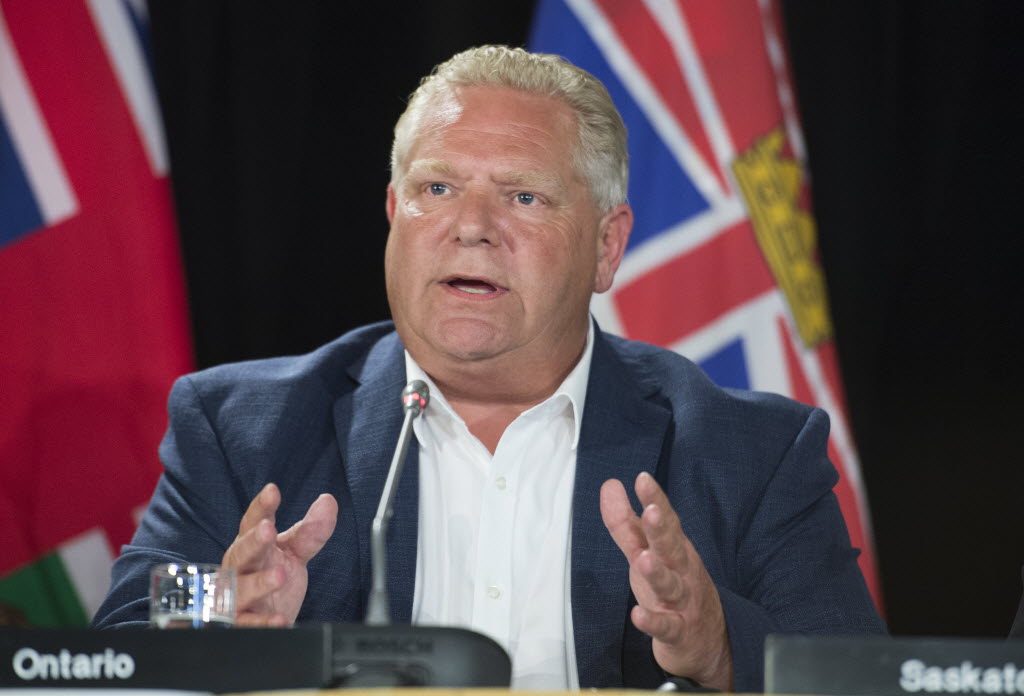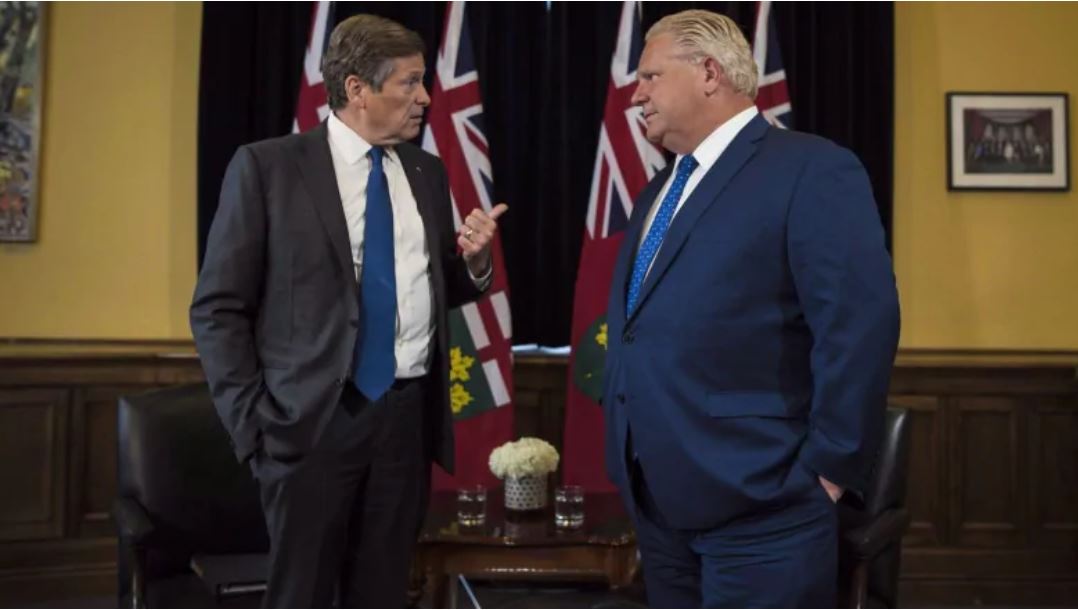
Media
Canadian Taxes - Interview with Jasmine Pickel
Ontario's MASSIVE debt problem
Ontario has a massive debt problem.
Ontario is the largest sub-sovereign debtor on the planet. What that means is that outside of the governments at the state or country level, Ontario is the most indebted government on the planet.
Let that sink in for a moment.
That debt has now surpassed 350 billion dollars.
Sometimes numbers that large can be hard to digest, so to break that down:
$350 billion dollars of debt means that each person in Ontario owes over $24,000. Sadly, instead of balancing its budget and paying down debt, Ontario’s government continues to spend more every day than it brings in.
This year, the government will add over $16 billion dollars to our debt That means we borrow $45 million per day, almost $2 million per hour, $31,000 per minute, and we add $523 to our debt every second.
We also have to pay interest on that debt, and it’s expensive. Interest on our debt is now the 4th biggest line item on Ontario’s budget every year, and we spend more on interest than we do on training, colleges and universities
Again, to put that into context, interest payments on our debt cost us:
13 billion per year, which is
36 million per day or
1.5 million an hour
25,000 per minute
Or 417 per second
Debt to GDP is a ratio that compares what a country owes with what it produces, and it indicates its ability to pay back its debt.
Ontario’s debt to GDP ratio is at historic highs at almost 41%.
More debt not only means that we have to pay more interest, but also higher interest rates if Ontario’s risk of default increases in the eyes of credit rating agencies.
Ontarians need to be concerned about the massive debt problem in this province and should support policies to reduce spending and waste. Please share this video to help raise awareness of this issue in our province.
After freezing driver and vehicle fees last year, Ontario wants to increase them by 2%
CBC, June 19, 2019Television
URL: https://www.cbc.ca/news/canada/toronto/driver-vehicle-fee-increase-ford-government-1.5181025
"Instead of raising fees to cover the cost of providing these services, the government should explore ways to reduce the cost of providing these services," the federation's interim Ontario director, Jasmine Pickel, said in a statement.

CP24: Ford considering unfreezing driver and vehicle fees
CP24, June 19, 2019Television
Canadian Taxpayers Federation Interim Ontario Director Jasmine Pickel slammed Ford government's proposal to start increasing drivers' licence fees again.

Ontario's massive debt problem
Sauga 960 AM, September 4, 2019Radio/Podcast

Taxpayers counting on Premier Ford to save smarter
Toronto Sun, July 11, 2019Print
Premier Doug Ford was elected to clean up the fiscal mess in Ontario, but his government’s attempts to do so have been hard to watch.
If Ford doesn’t fix his strategy, he may lose his chance to fix the province.
Ontarians want less spending. We just have one request: save smarter.
Here are a few ideas.
Instead of starting with the autism file, let’s look at Ontario’s single largest expenditure item: the salaries of government employees.
About half of all provincial spending — $72 billion annually — goes to government employees. A 2018 Fraser Institute report shows their wages are 11% higher than their non-government counterparts, in addition to receiving better pensions and retiring earlier. Bringing public sector wages in line with those in the private sector would save close to $8 billion and go a long way toward eliminating the nearly $12 billion dollar deficit planned for this year.
Would government union bosses howl to high heaven? Yes they would. Would ordinary Ontarians who pay their well-padded salaries feel sorry for them? I’m willing to bet not.
Here’s a group even less likely to get public sympathy: wealthy corporate-welfare recipients. This should be obvious for a premier who has repeatedly stated that the government doesn’t create jobs. Ontarians are disgusted when governments hand our hard-earned tax dollars to profitable corporations. That was evident from the public outrage that ensued following the federal government’s $12 million handout to Loblaws.
A government “for the people” should be the staunchest critic and biggest opponent of corporate welfare. After Ford gave Maple Leaf Foods $35 million of taxpayers’ money, the corporation laid off 300 workers.
Instead of bickering with the federal Liberals about who was to blame for the Bombardier plant closure in Thunder Bay, Ford should have pointed out that it’s wrong for the company to have received $4 billion in taxpayer handouts while the Bombardier family’s net worth is nearly $3 billion.
It’s hard to imagine multinational corporations generating sympathy from taxpayers, but if the CEOs of these companies want to protest cuts to corporate welfare with placards in front of Queens Park, they’re welcome to try.
Finally — for good measure — let’s wallop the money-wasters of Ontario. Everyone can get behind that. Two top-of-mind examples are the City of Toronto and its public school board, the TDSB.
Both quietly chose to opt out of provincial competitiveness legislation earlier this year that was recommended by the city manager as it could save up to $48 million per year. Instead, they voted to limit construction contract bidding to a select group of unions, so we can expect to see more inflated prices.
Remember the city’s park staircase that could have cost $150,000 (which was later built by a local maverick for $550), or the TDSB’s pencil sharpener that cost $143 to install 4 screws? Toronto Mayor John Tory actively campaigned against Ford’s funding cuts to the city, yet turned down this obvious opportunity to save the city millions through simply opening construction bidding.
How easy would it be to save money by shopping around for the best price on construction projects? Virtually every other city in the province is already doing it. It’s that easy.
Taxpayers are counting on Ford to reduce spending, but voters will kick him out if he’s not smart about where he saves. Bloated bureaucracies, corporate welfare cheques, and municipal money-wasters should be first on the chopping block.

Fiscal restraint? Doug Ford's Ontario government spent billions more than Wynne had planned in 2018-19
Financial Post, September 5, 2019Print
They say, when delivering negative feedback, to use the sandwich approach: compliment, criticism, compliment.
So when it comes to the Ontario Progressive Conservative party’s financial performance, let’s start by commending the government’s Fiscal Sustainability, Transparency and Accountability Act, which improves transparency in public reporting. That includes the recently released first quarter report. Fixing the fiscal mess in Ontario requires being transparent with the populace about just how dire their finances are. So great work there.
However, if the report makes one thing clear, it’s that the government has a lot of work to do to get Ontario’s spending under control.
Premier Doug Ford’s government was elected to clean up the fiscal mess left behind by its predecessors — $325 billion of debt to be exact, which marks a staggering increase of 134 per cent from the time the Ontario Liberals took office in 2003. At the time of the June 2018 election, the previous government was spending $40 million more every day than it was collecting in revenue. Let that sink in for a moment.
Ontarians wanted spending restraint and hoped that a change in government could get the job done.
Much to the chagrin of any Ontarian who waited 15 years for the province to spend less and pay down debt, the new government brought more of the same: increased spending and growing debt. To the surprise of many, the Ford government’s spending has surpassed that of its predecessor at its moment of greatest excess.
In the lead-up to last year’s provincial election, it was not uncommon to hear of then-premier, Kathleen Wynne, satirically referred to as Santa Claus. Her government was, after all, offering all sorts of free gifts to Ontarians in an attempt to curry electoral favour.
In its March 2018 budget, for example, she had added $20 billion in new program spending. In total, her budget was set to cost $159 billion, an increase of nearly 12 per cent from the previous year. But despite the goodies on offer, Ontarians rejected overspending in a decisive move toward restraint and placed Doug Ford in the premier’s chair.
Shockingly, the budget that followed revealed Wynne’s plan could have been the cheaper option. In the 2018-19 fiscal year, the PC government spent a total of $163 billion — a whopping $4 billion more than the Liberal party had planned. The province’s debt rose by nearly $12 billion.
In response, Moody’s credit rating agency downgraded the province from “stable” to “negative,” which made the debt burden even more expensive. Although the Fitch ratings agency has returned the province’s credit rating to “stable,” based on the government’s plan to return to fiscal balance by 2023, Ontario’s debt burden continues to grow. Current interest charges on the debt are projected to be over $13 billion this year, which will eat up approximately nine per cent of revenue from the 2019-2020 budget plan. Interest charges on its debt are now the fourth largest expenditure line item on Ontario’s books, higher than spending on “training, colleges and universities,” which amounts to just over $11 billion.
Yet even with this all laid out clearly in its recently released report, the government has already spent an additional $182 million more than it budgeted for in April. Was this spending necessary? To take just one example — $12 million to “support Ontario grape growers, wineries, small distilleries and craft cideries” — the answer is clearly “no.”
The dire and declining state of Ontario’s finances should concern everyone. Debt today means taxes tomorrow, and each Ontarian already owes more than $24,000 thanks to government overspending. Ontario’s debt grows by $523 each second. Ontarians pay $1.5 million every hour on interest alone.
A recent report by the Fraser Institute estimates that at the current rate of spending, an additional $42 billion will be added to Ontario’s debt from now until the government balances the budget in 2023 — which isn’t, conveniently, until after the next election.
Ontarians are counting on this government to control spending and pay down the provincial debt. There are many opportunities for savings — from corporate welfare to municipal waste — that the government needs to act on now, not in 2023.
To end with a compliment, cheers to Ford on beer in corner stores.

Toronto needs to stop blaming Doug Ford and get serious about saving
The Globe and Mail, August 23, 2019Print
Is it possible for the City of Toronto to save money?
That question came to the fore earlier this week when Ontario Premier Doug Ford announced his government’s plan to change its cost-sharing arrangement with municipalities, including for public health.
At present, the province covers 75 per cent of the cost for most of Toronto’s public-health programs and the city pays 25 per cent. There are some programs for which the province picks up the entire tab. The newly announced changes will aim to reduce the province’s burden in the public-health cost-sharing arrangement down to a 70-30 split with municipalities effective Jan. 1, 2020.
Mr. Ford did this because Ontario is in a fiscal crisis. The province’s debt is approaching $350-billion and grows by $523 every second. If Ontario is going to return to balance, Toronto needs to do its part.
In total, the provincial government is asking the city to take responsibility for an additional $4.3-million portion next year of its public-health budget, which is a capped increase of 10 per cent more than what the city is currently contributing. The increase amounts to less than 1 per cent of the city’s current operating budget of more than $13-billion.
Unsurprisingly, the response at Toronto City Hall was outrage. Councillor Joe Cressy summed up the hysteria by asserting that these changes were an attack on Ontarians, not far off from his earlier remarks that people would die if provincial funding for public health was reduced.
Sadly, the only thing more predictable in Toronto than a public-transit delay is a profligate city council with an inability to control spending, and a propensity to cry foul whenever anyone dares suggest it might be possible.
Although the city will be taking the Premier up on his government’s offer to fund a line-by-line audit to help it find savings, there have been sundry opportunities to save money that Toronto City Council has foolishly brushed aside.
Take, for example, city council’s decision to opt out of provincial competitiveness legislation that would have opened tendering for construction contracts in Toronto to non-unionized workers. Estimates suggest that this simple decision could have saved the city up to $48-million, which is why city manager Chris Murray recommended city council vote to open tendering. Mayor John Tory and Mr. Cressy voted against it.
Thankfully, there are some city councillors who recognize the urgent need for the city to save money, such as Stephen Holyday, who wore a life jacket to the June 19 vote to dramatize Toronto’s slide toward a fiscal emergency. Sadly, 19 of his city council colleagues voted in favour of closed bidding for select unions – as did the Toronto Community Housing Corp. and the Toronto District School Board – so we can expect to see more outrageous costs such as the $150 bill to install a pencil sharpener.
Not long after Mr. Cressy said people would die because of a lack of public-health funding, Toronto City Council announced with great pride that it was sinking another $7.5-million into Bike Share Toronto. This is a program that has lost money every year since 2014 when it was transferred from Bixi to the Toronto Parking Authority, and has already received more than $27-million in taxpayer subsidies since 2016 for capital costs alone (and that’s to say nothing of unfunded operating losses).
While cities such as Calgary and Montreal open their doors to bike-share models that are profitable, sustainable and entirely funded by the private sector, Toronto has decided to let sunk costs justify future spending on an antiquated bike-share model that will continue to plague taxpayers for years to come.
By now, it shouldn’t be a surprise that Toronto fritters away taxpayer dollars carelessly. This is, after all, the city that lost $2.6-million worth of productivity on the city’s urban-forestry program by paying contractors to water dead tree stumps.
Many cried foul over Toronto being asked to cover a $4.3-million portion of its public-health budget next year, but the province pays more than that – $36-million – on interest on its debt every day. Debt reduction and fiscal responsibility should be the first priority of anyone who purports to care about public health in this city or province.
Ontario government paying for BuzzFeed quizzes as part of cannabis education campaign
Global News, August 8, 2019Online
URL: https://globalnews.ca/news/5744115/buzzfeed-quizzes-cannabis-ontario-government/
Biography
Jasmine Moulton is a self-made, serial entrepreneur. She launched her last company, a Toronto-based social media marketing agency, while completing her MBA at the University of Toronto. In 2017, she sold her agency in a successful acquisition deal with a PR firm from New York, which consistently ranks on Observer’s list of 50 Most Powerful PR Firms in America. From her first job working as Legislative Assistant in the House of Commons to running a business in the heart of Toronto, Moulton has witnessed first-hand how poor government policy can hurt those it purports to help. Following the sale of her business, she joined the Canadian Taxpayers Federation as Interim Ontario Director where she brings a strong voice advocating for lower taxes, less waste, and accountable government.
Past Talks
Canada's Fresh Political Voices
Empire Club of Canada
Albany Club Toronto, May 22, 2019
Testimonials
“Jasmine Pickel was a guest speaker twice for our Social Media for Small Business workshop. She has a wealth of knowledge on the topic and provided in-depth explanations as well as suggested resources to help audience members understand. It felt less like a presentation and more like a conversation. Thank you for helping Rise entrepreneurs!”
“Jasmine successfully delivered the keynote address two years in a row for RBC's notable Small Business Week celebrations – first hosted at Mattamy Athletic Centre, then at an RBC Event Space located in the heart of Toronto’s Financial District. Jasmine was amazing. She was very effective and the guests really enjoyed her presentation.”


